Abolish Collegiate Athletic Scholarships

While some students spend hours studying to get accepted into college, others are receiving scholarships from Ivy League schools without wasting a single second looking in their textbooks. Instead, they dedicate their high school lives completely to one sport and are talented enough to not only be admitted into a college but with a full scholarship as well. Many athletes who are accepted into the most prestigious colleges in America simply are unable to compete in grades, standardized test scores, and additional extracurricular activities with the other students who receive admittance into the same college. The definition of college is “an institute of higher learning,” according to Websters Dictionary, yet often times, colleges are more attracted to athletic students rather than scholarly students. Colleges should prioritize students based on their educational skills before their athletic abilities. Although skillful athletes should be recognized and rewarded, they should not gain an unfair academic advantage over students who wish to attend college for its intended purpose.
Since athletics play a big role in the money-making aspects of schools, admittance officers feel they must make special exceptions and lower academic standards for recruited athletes. For example, researchers at Princeton University found recruited athletes were given an admissions boost on the SAT by about 200 points. In addition, according to Stanford recruitment, class of 2009, the median football player who reported their scores received an 1800 out of 2400 on the SAT where the average SAT score at Stanford is 2210. It is unacceptable that athletes would be accepted and offered scholarships over students who work extraordinarily hard on their academics and schoolwork. Moreover, the future for most college scholarship athletes is not much better when they get accepted and receive scholarships to play for the team.
After an athlete does receive a scholarship to their dream college and is playing for their school team in college, what happens next? The majority of aspiring, young, football players who strive to make it to the National Football League (NFL) are not actually recruited; only about 1.6% of college players are drafted into the NFL, according to the NCAA. Most of the football players who hope to go professional do not end up making it in the big leagues. Starting from high school, gifted athletes are encouraged to prioritize sports over their academic activities. When they finally realize that they are not good enough, strong enough, or fast enough, it is too late to re-prioritize.
Athletic scholarships bring not only inequality in deciding possible candidates for a school but also create problems for the athletes themselves. Many athletes who are accepted into a college with a scholarship do not have the adequate qualifications that every other normal student is expected to have. These athletes have a very small chance at making it to the major leagues, and focusing their efforts into their sport only will prevent them from entering into a steadier career. Athletic talent cannot influence the admission officers’ decisions over a person with excellent grades and test scores. Colleges are constantly looking to find different ways to level the playing field for people of different backgrounds and situations, and athletic scholarships are not making their situation any better.
Hello there! Our goal is to provide relavent, engaging journalism for readers of all ages. Your donation will support the student journalists of the Wolfpacket at Claremont High School, and will allow us to purchase equipment, print our monthly issues, and enter in journalism competitions. We appreciate your consideration!

Sydney Hwang is a senior at Claremont High School, and it is her fourth year on The Wolfpacket. She is excited to be the Editor-in-Chief this year and...




